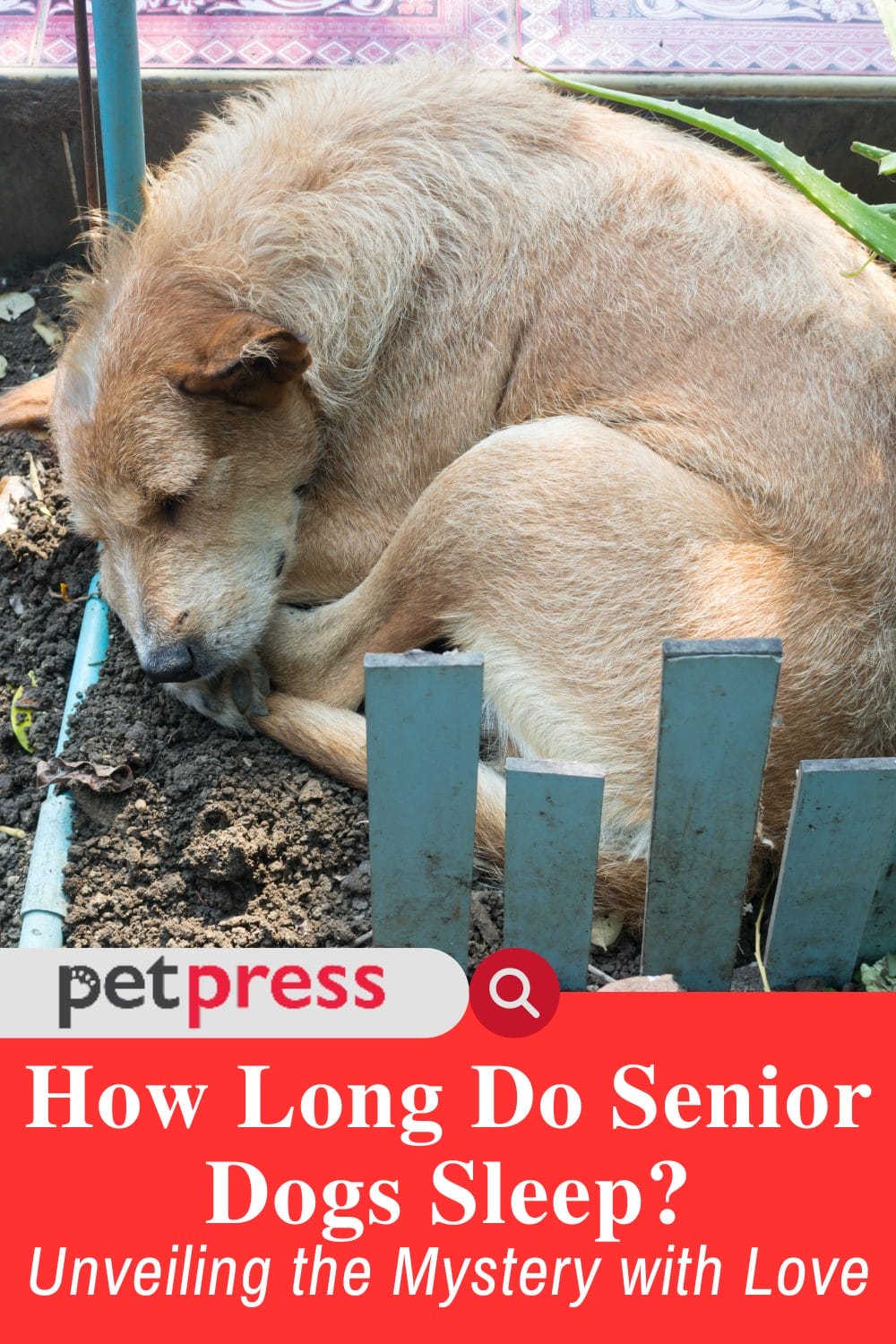
When our beloved dog reaches the senior years, a question often arises: how long do senior dogs sleep?
When it comes to the love we share with our dogs, age is just a number. The bond that’s formed and developed over the years deepens as they gracefully grow old, maturing into their senior years.
Our Aging Pups: Understanding Their Sleeping Patterns
As our faithful friends enter the golden years, their energy levels wane. On average, a healthy senior dog might sleep between 12 and 14 hours a day, even more if they have health issues.
It’s not uncommon for them to take longer naps and rest more frequently. This increase in sleep is mostly due to changes in their metabolic and energy needs.
The Dog’s Age and Breed
The sleep pattern of a dog can be influenced by its breed and age. It’s been observed that larger breeds tend to age faster and require more sleep than smaller breeds.
Furthermore, different breeds of dogs have different sleeping schedules. For instance, a 7-year-old poodle may have a different sleeping schedule than an 11-year-old Labrador Retriever.
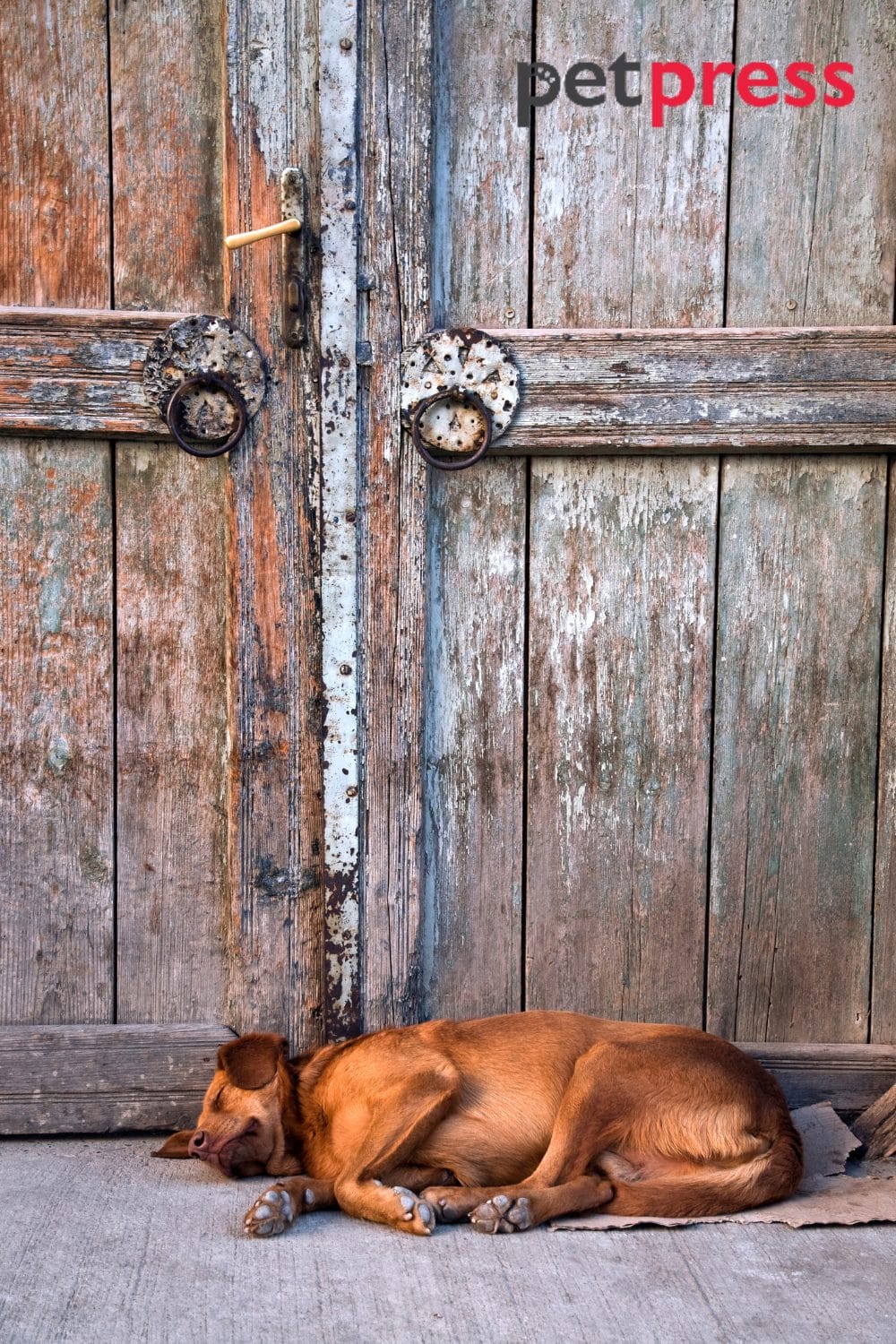
Health Concerns
A sudden increase or decrease in sleep could indicate a health concern such as arthritis, diabetes, or thyroid issues. If you notice any drastic changes in your senior dog’s sleeping pattern, it’s advised that you consult your veterinarian immediately.
As our cherished four-legged friends journey into their golden years, they become more susceptible to various health issues like us. These health challenges can significantly impact their sleep patterns and overall quality of life.
Thus, it becomes even more crucial for us as pet parents to stay vigilant and attentive to their needs. Here are a few health issues that could alter a senior dog’s sleep.
Arthritis
As dogs age, arthritis can become a prevalent issue that affects them. The pain and discomfort caused by this condition can make it difficult for them to find a comfortable position and fall asleep. Moreover, it can also disturb their sleep cycle, causing them to wake up more frequently during the night.
Diabetes
Diabetes can affect a dog’s sleep by causing frequent urination, which can disrupt their sleep as they may need to go outside more often. Dogs with diabetes can also experience fatigue and lethargy, leading them to sleep longer than normal.
Thyroid Problems
Hypothyroidism is a common condition in older dogs. One of its symptoms is excessive tiredness and sleepiness. If you notice your senior dog is sleeping more than usual, it would be wise to consult with your veterinarian about possible thyroid issues.
Canine Cognitive Dysfunction (CCD)
Canine Cognitive Dysfunction, or dog dementia, affects behavior, memory, and sleep patterns similar to Alzheimer’s in humans. Dogs suffering from CCD might sleep during the day and become restless at night. This change is often accompanied by confusion and anxiety.
Heart Disease
Heart disease in dogs often leads to decreased activity, which may cause them to sleep or rest more. This is generally due to the body trying to conserve energy.
If you notice that your senior dog is sleeping excessively or having trouble sleeping, it’s essential to take them to a vet for a check-up. Remember, early detection is key to managing most health conditions. Your alertness can significantly enhance their comfort and quality of life in their twilight years.
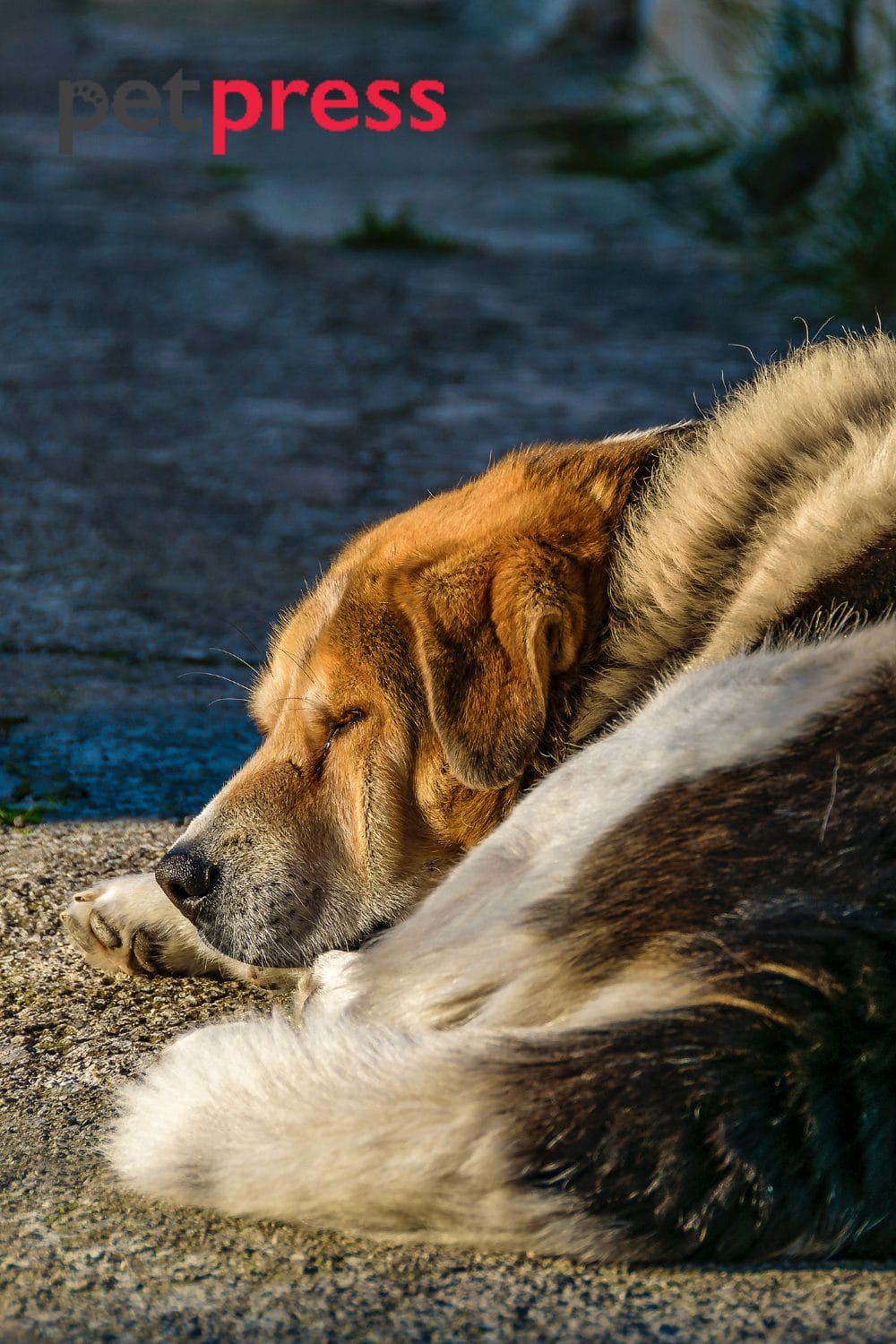
Identifying Abnormal Sleep Patterns in Senior Dogs
As our dogs reach their golden years, changes in their sleep patterns are a natural part of aging. But how can we distinguish between these normal changes and signs of potential health problems?
Noticing abnormal sleep habits in your senior dog early can help you intervene and manage any underlying health issues more effectively.
Increased Restlessness
One of the first red flags may be increased restlessness during sleep. If your dog seems to have trouble settling down, constantly changes positions, or wakes up frequently, these could be signs of discomfort, pain, or more serious health issues.
Excessive Sleep or Lethargy
While it’s normal for older dogs to sleep more, excessive sleep can cause concern. If your dog sleeps most of the day, seems sluggish even after a long sleep, or fails to wake up for meals or favorite activities, it might be time to consult your vet.
Changes in Sleep-Wake Cycle
Another sign of abnormal sleep is a change in your senior dog’s sleep-wake cycle. If your dog sleeps more during the day and becomes active at night, this could indicate canine cognitive dysfunction (CCD) or other health problems.
Difficulty Getting Up
If your dog appears to have difficulty getting up after resting or sleeping, this could suggest arthritis or other mobility issues. Pain or discomfort may disrupt your dog’s sleep, causing them to be lethargic or appear tired.
Frequent Nighttime Urination
Frequent urination during the night can disturb your dog’s sleep and could be a sign of underlying health conditions such as diabetes or kidney disease.
If you observe any of these symptoms or noticeable changes in your dog’s sleep patterns and behavior, it is crucial to seek advice from your veterinarian. Early detection of potential health issues can significantly enhance your dog’s comfort and quality of life.
Remember, your vigilance is an integral part of their aging process.
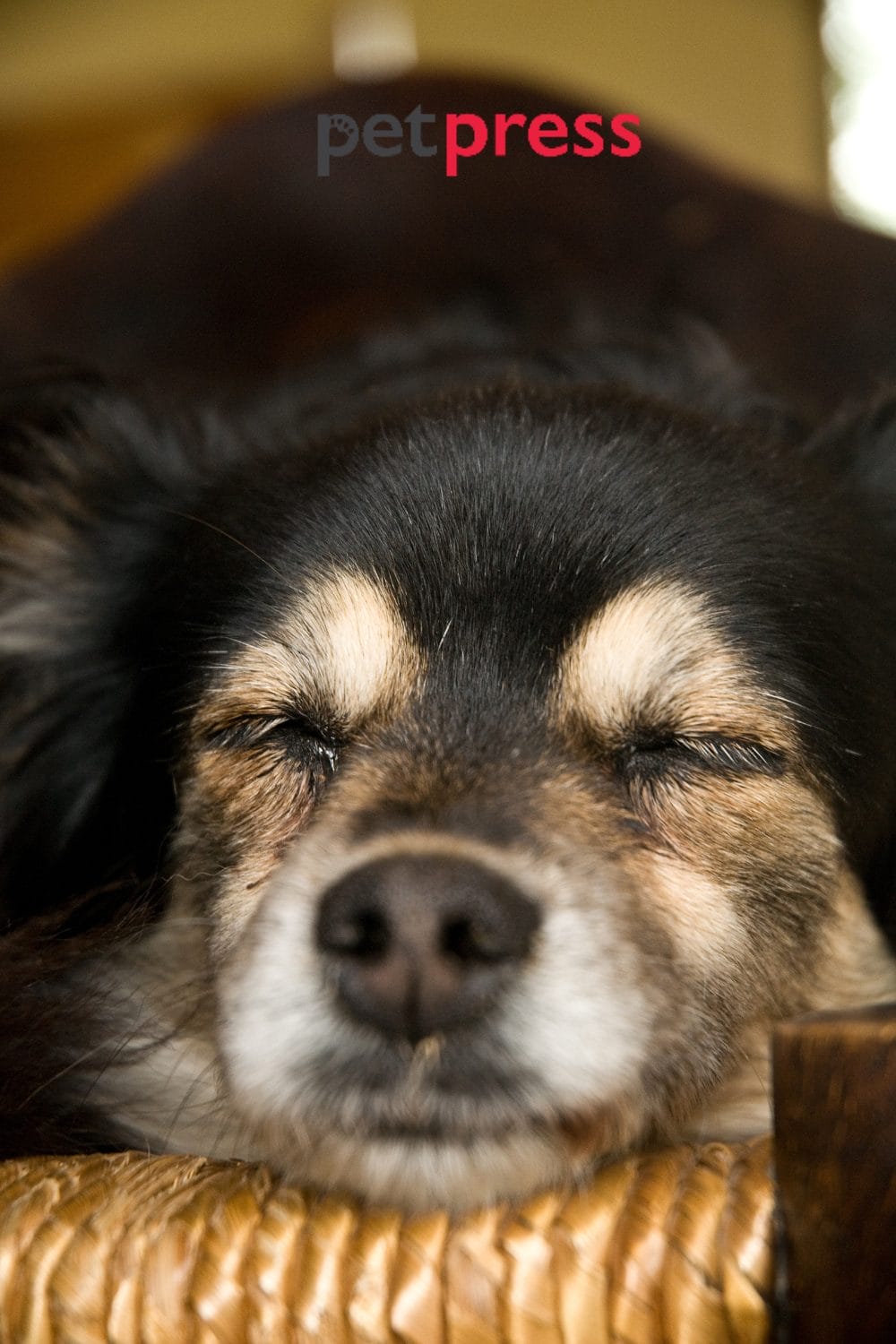
Ensuring Quality Sleep for Your Senior Dog
As our canine companions embark on their golden years, their need for quality sleep increases. As pet parents, prioritizing their sleep health paves the way for their overall well-being and contentment. Here are some expanded tips to ensure your older dog’s sleep is of the highest quality:
Maintain a Consistent Schedule
Maintaining a consistent schedule is crucial for improving your senior dog’s sleep quality, as dogs, like humans, have an internal body clock called the circadian rhythm that regulates their sleep-wake cycle.
Keeping a routine for meals, walks, playtimes, and bedtimes helps regulate this internal clock. This consistency is especially beneficial in promoting a healthier sleep cycle as it aligns their routine with their natural patterns.
For example, feeding your dog simultaneously every day, taking them for walks, and setting a specific bedtime can reinforce their sleep rhythm. This familiar routine can also comfort senior dogs, reducing anxiety and promoting better sleep.
Create a Comfortable Sleeping Area
As dogs age, their bodies undergo various changes. They may suffer from joint pains and other physical discomforts due to arthritis. These issues can make it challenging for them to get comfortable, affecting their sleep quality.
A comfortable, warm, and soft sleeping area can improve sleep quality. Consider investing in a bed designed for senior dogs, which often includes features like memory foam for extra support and warmth for aging joints.
Additionally, ensure that the sleeping area is free from noise and excessive light, as these can cause disturbances and interrupt their sleep.
Keep Them Active
While senior dogs may lack the boundless energy of their puppy days, they still need regular physical and mental exercise to stay healthy. Gentle exercise, such as walks or light play, can help keep their bodies in good shape and their minds sharp.
Besides the physical benefits, exercise aids in better sleep. Regular activity helps tire them out naturally, promoting deeper, more restful sleep.
Consistency is key, and exercise should be tailored to suit your senior dog’s energy levels and physical comfort. Overexertion can lead to injuries or excessive fatigue, so finding the right balance is important.
In conclusion, ensuring quality sleep for your senior dog involves understanding their unique needs and making necessary adjustments in their routine. As their trusted companion, your support and care can significantly enhance their golden years, imbuing them with the comfort and rest they deserve
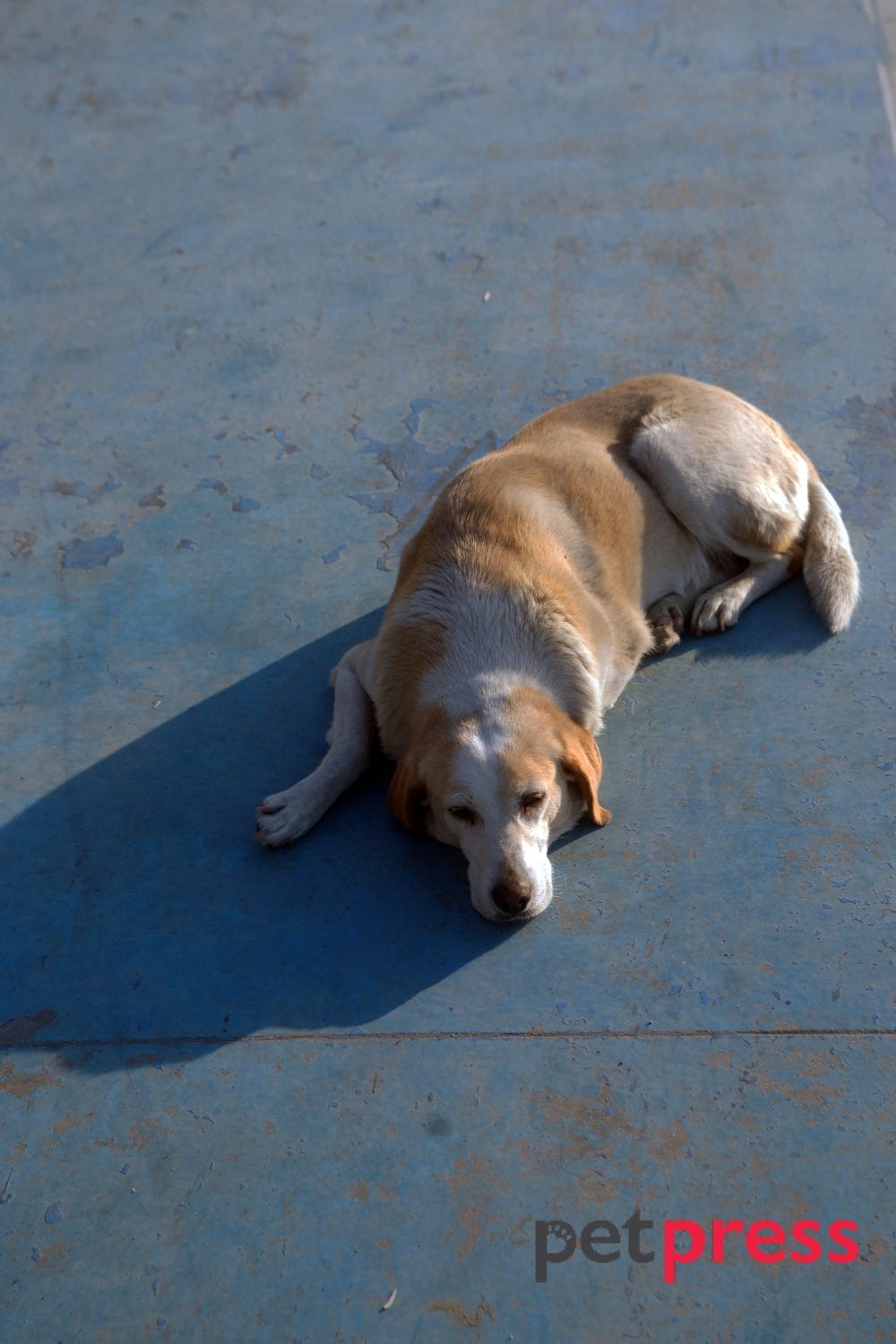
Wrapping Up: The Sleepy Mystery Unveiled
To wrap up, observing and understanding your senior dog’s sleeping patterns is vital. It ensures that they continue to enjoy their golden years with the love and dignity they deserve.
Recognizing their changing needs and adjusting accordingly will cement your relationship, making the twilight of their lives the best chapter yet.
If you found this post relatable, please don’t hesitate to share it with your friends, family, and all the dog lovers you know on your social media channels. They might find it insightful, and who knows, it could strengthen the bond with their furry companions.
Remember, each share is a step towards educating and creating an even more understanding and empathetic community for our aging canine companions. So, click that share button without hesitation and spread the love far and wide!
Let’s celebrate #SeniorDogSleepAwareness together!

5 FAQs on Senior Dog Sleep
A healthy senior dog might sleep anywhere between 12 to 14 hours a day. But this can increase if they have any health issues.
Larger breeds typically need more sleep as they age faster than smaller breeds. Similarly, a senior dog’s age can also affect their sleep schedule.
Yes, health concerns like arthritis, diabetes, thyroid problems, Canine Cognitive Dysfunction (CCD), and heart disease can significantly impact a senior dog’s sleep patterns.
Maintaining a consistent schedule, creating a comfortable sleeping area, and regular, gentle exercise can significantly improve your senior dog’s sleep quality.
Increased restlessness, excessive sleep, changes in the sleep-wake cycle, difficulty getting up, and frequent nighttime urination can indicate abnormal sleep patterns in your senior dog.
Looking for dog quotes? We got you!
Paw-sitive Wisdom: 50+ Inspiring Bloodhound Dog Quotes
50+ Samoyed Dog Quotes and the Best Life Wisdom They Share
The Wisdom in Every Bark: Top 50 Pomeranian Dog Quotes
- Can Pets Sense Pregnancy in Humans? - October 1, 2024
- 6 Unusual Pets for Adventurous Owners: From Tarantulas to Pigs - September 30, 2024
- Feline Hyperthyroidism: Early Signs and Modern Treatments - September 30, 2024


GIPHY App Key not set. Please check settings